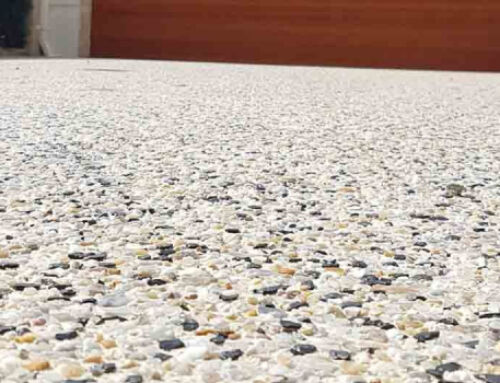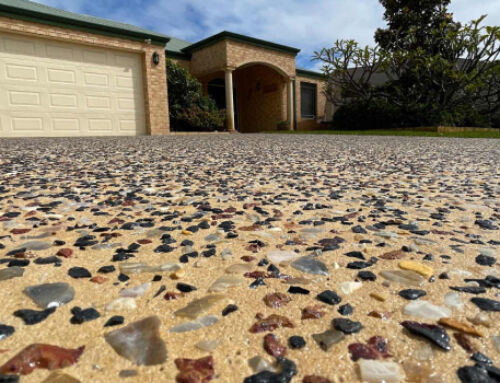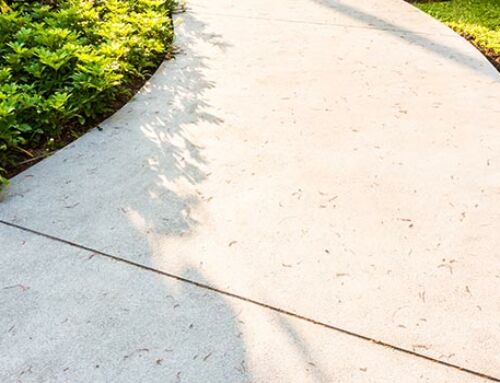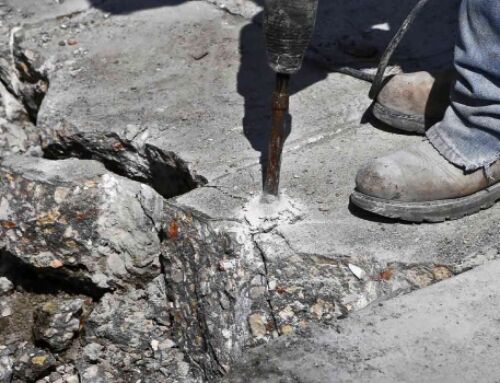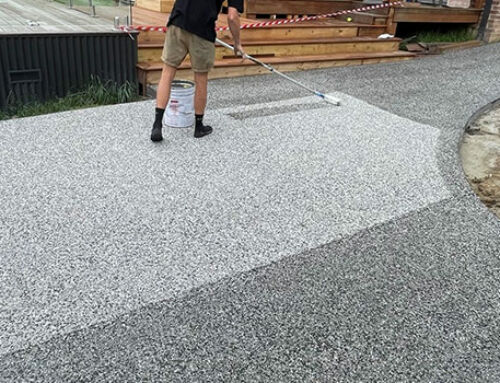When it comes to laying a new driveway, the devil is in the details—or in this case, the thickness.
Getting your driveway thickness correct can be the difference between a driveway that stands the test of time and one that crumbles under the first heavy downpour.
While concrete driveways are a popular choice across Melbourne due to their long lifespan and minimal maintenance requirements, the foundation of their durability lies beneath the surface: the thickness of the concrete itself.
This isn’t just about laying a slab; it’s about understanding the science and standards that ensure your driveway can handle everything from your family car to the odd delivery truck.
If you’re looking to upgrade your residential property by improving or replacing your driveways, we’ve rounded up everything you need to know.
This article dives into the minimum thickness required for concrete driveways in Melbourne, exploring why it matters, the risks of skimping on material, and how proper planning can save you from future headaches.
Whether you’re building a new or upgrading an existing drive, you’ll find out just how deep your concrete needs to be to keep your driveway solid, safe, and aesthetically pleasing for years to come.
CONCEPT CONCRETE SUMMARY:
|
Here’s What You Need to Know About Concrete Driveways
Driveways are not just a functional part of home architecture but also an aesthetic enhancement that can increase property value.
In Melbourne, where the climate can range from scorching summers to wet winters, choosing the right type of concrete driveway is crucial for longevity and durability.
Types of Concrete Driveways
- Plain Concrete: The most basic and cost-effective option, plain concrete offers a clean, simple look and serves well in terms of durability. It can be enhanced with different finishes to improve traction and aesthetics.
- Coloured Concrete: Through the addition of pigments, concrete doesn’t just perform well—it can also look attractive. Coloured concrete is popular for those wanting to match or complement their home’s exterior.
- Stamped Concrete: Also known as textured or imprinted concrete, stamped concrete replicates the appearance of stone, tiles, brick, or even wood. It offers a high-end look without the corresponding price tag of natural materials.
- Exposed Aggregate: This type involves removing the top layer of cement paste to reveal decorative coarse aggregate (either natural or manufactured). Exposed aggregate is prized for its robustness and slip-resistant surface.
What Are The Most Common Types of Concrete Driveways? [And How To Choose One]
Advantages of Concrete Driveways
- Durability: They are incredibly durable and can last up to 30 years with proper maintenance.
- Low Maintenance: Unlike asphalt, concrete does not require regular sealing and is less prone to damage from oils and gasoline.
- Aesthetic Flexibility: With various finishing techniques, concrete can enhance the curb appeal of your property.
- Reflectivity: Concrete reflects light better than darker materials, reducing the need for extensive exterior lighting.
Challenges Faced with Concrete Driveways
- Cost: Initial installation costs for concrete are higher than those for asphalt. The specialised finishes and colours can also add to the expense.
- Cracking: While concrete is durable, it can be susceptible to cracking over time, especially if the foundation work is not properly done or if it experiences severe weather changes.
- Staining: Concrete is porous and can absorb stains from oil, paint, and other leaking materials, which might require pressure washing or other forms of cleaning.
Understanding these types, advantages, and challenges helps homeowners in Melbourne make informed decisions about their driveway installations, ensuring they choose the right type to meet their aesthetic preferences and practical needs.
Minimum Thickness for Melbourne Driveways
When planning the construction of a concrete driveway in Melbourne, one of the most critical aspects to consider is the minimum thickness of the concrete.
This measurement is not only pivotal for ensuring the longevity and functionality of the driveway but also for adhering to local building standards.
Understanding Concrete Thickness
The thickness of your concrete driveway affects its ability to withstand the weight of vehicles and resist weather-related damage.
In Melbourne, where both residential traffic and weather can be demanding, getting this aspect right is key to a successful driveway installation.
Standard Thickness Requirements
The standard minimum thickness for a residential concrete driveway in Melbourne is typically 100 mm (millimetres).
This thickness is considered sufficient for most residential applications, where the driveway is subjected to regular passenger vehicles like cars and SUVs.
Factors Influencing Thickness
Several factors can influence the need for a thicker slab:
- Heavy Vehicles: If the driveway will regularly support heavier vehicles, such as RVs, trucks, or boats, a thickness of at least 125 mm is recommended to prevent cracking and structural damage.
- Subgrade Quality: The type and quality of the soil underneath the concrete also play a crucial role. Poor, unstable, or highly expansive soils might require a thicker slab or additional reinforcement to ensure stability.
- Climate Conditions: Extreme weather conditions, such as frequent heavy rainfall or extreme temperature fluctuations, can affect the concrete’s durability. In such cases, adjustments in thickness or protective treatments might be necessary.
Reinforcement Considerations
In addition to thickness, reinforcement with steel bars (rebar) or wire mesh is crucial, particularly in areas with harsh environmental conditions or heavier loads.
This reinforcement helps distribute the weight more evenly and prevents cracking, adding to the overall integrity and lifespan of the driveway.
By adhering to these guidelines, homeowners in Melbourne can ensure that their driveways are built to last, offering robust performance under a variety of conditions.
Wrapping It Up: Key Takeaways
- Minimum Thickness: For most residential driveways in Melbourne, a minimum concrete thickness of 100 mm is standard, increasing to 125 mm for heavier vehicles.
- Types and Benefits: Options like plain, coloured, stamped, and exposed aggregate concrete offer different aesthetic and functional benefits, from increased durability to enhanced curb appeal.
- Regulatory Compliance: Ensure compliance with local council regulations concerning driveway construction, including obtaining the necessary permits and adhering to specific building codes.
- Environmental and Legal Considerations: Addressing stormwater management and using sustainable materials can not only help meet regulatory requirements but also contribute to environmental conservation.
Before moving forward with your driveway project, it’s crucial to consider your specific needs and the unique characteristics of your property.
Consulting with a construction or civil engineering expert can provide tailored advice and ensure that your driveway is not only beautiful but built to last. By taking these steps, you’ll ensure that your investment enhances both the functionality and value of your home.
Ready to Pave the Way? Contact Concept Concrete Today!
At Concept Concrete, our expert team is committed to providing top-tier services and avoiding costly errors, ensuring that every driveway project meets the highest standards of quality and compliance.
Whether you’re looking to install a new driveway or upgrade an existing one, we’re here to offer personalised advice tailored to your specific needs.
With our extensive experience and commitment to excellence, we ensure that your driveway is not only aesthetically pleasing but also durable and compliant with all local regulations.
Reach out to speak to a member of the Concept Concrete team today on 1300 366 343 or request a fast and FREE quote online.


